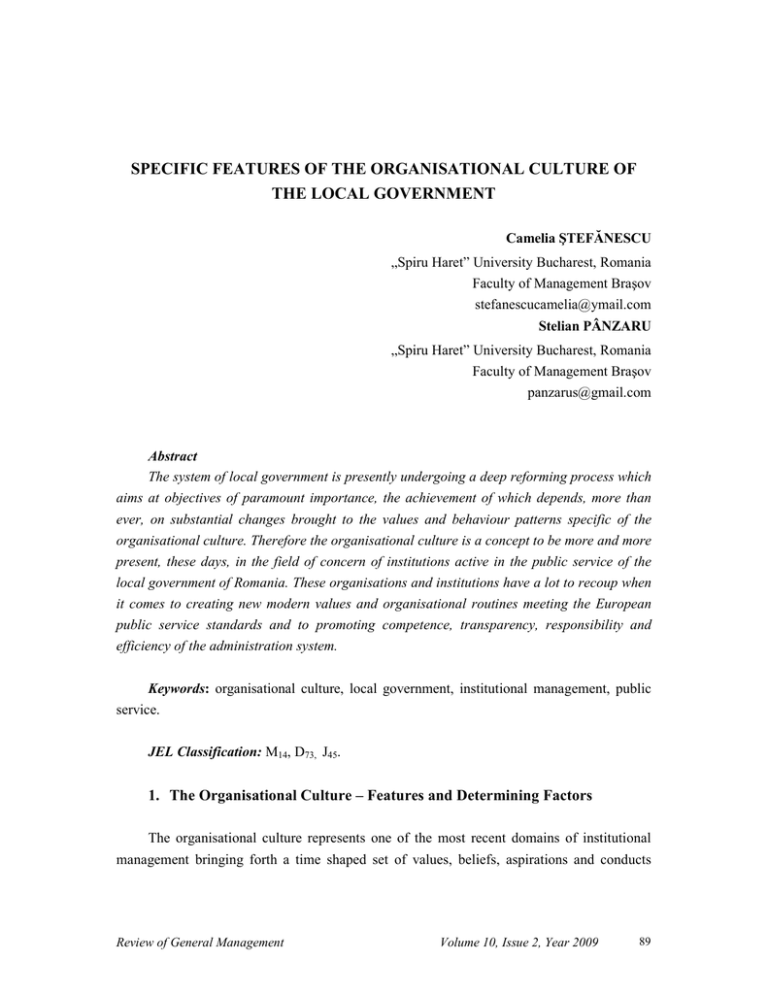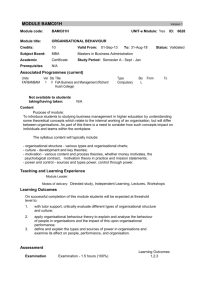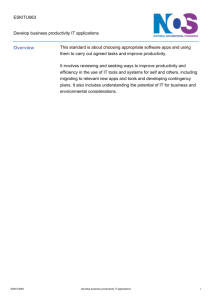SPECIFIC FEATURES OF THE ORGANISATIONAL CULTURE OF THE LOCAL GOVERNMENT
advertisement

SPECIFIC FEATURES OF THE ORGANISATIONAL CULTURE OF THE LOCAL GOVERNMENT Camelia ŞTEFĂNESCU „Spiru Haret” University Bucharest, Romania Faculty of Management Braşov stefanescucamelia@ymail.com Stelian PÂNZARU „Spiru Haret” University Bucharest, Romania Faculty of Management Braşov panzarus@gmail.com Abstract The system of local government is presently undergoing a deep reforming process which aims at objectives of paramount importance, the achievement of which depends, more than ever, on substantial changes brought to the values and behaviour patterns specific of the organisational culture. Therefore the organisational culture is a concept to be more and more present, these days, in the field of concern of institutions active in the public service of the local government of Romania. These organisations and institutions have a lot to recoup when it comes to creating new modern values and organisational routines meeting the European public service standards and to promoting competence, transparency, responsibility and efficiency of the administration system. Keywords: organisational culture, local government, institutional management, public service. JEL Classification: M14, D73, J45. 1. The Organisational Culture – Features and Determining Factors The organisational culture represents one of the most recent domains of institutional management bringing forth a time shaped set of values, beliefs, aspirations and conducts Review of General Management Volume 10, Issue 2, Year 2009 89 which determine and define its organisational life. The same elements also define the conduct of the human factor within the organisation and influence in a direct or indirect manner, the function and performance level of the organisation. The interest in the organisational culture is generated by the strong sensitivity of the institution to the possibility to influence the attitude and conduct of the staff. To understand more accurately the concept of organisational culture one must highlight the relation between culture and organisation. The literature dedicated to the subject deals with an entire series of different approaches. Hofstede (1996, p.95) mentions two of the approaches, namely: The approach based on culture being perceived as an asset owned by the organisation which it can shape and integrate in a strategy to be used as managerial instrument; The other mentioned approach considers culture as the organisation itself, the aggregate of the experiences jointly generated and lived by the members of a team. The organisational culture resides in a set of norms, rules and values which define the cultural profile and consolidate the internal consistency of the organisation by the cultural programming of the interpersonal relationships of its members (Nicolescu, O., Verboncu I., 1999, p.45). Traditionally, the concept of organisational culture values traditions, myths, symbols, beliefs, models, attitudes intended to support the individual and group interests of the members of an organisation. We are talking about a set of values, thinking patterns, written and unwritten rules generated through a step by step process of considering certain things as "true beyond any doubt" which define the organisational conduct and routine. From the modern perspective, the organisational culture is viewed as the "pattern of basic assumptions which a group invent, discover or develop in learning to solve their external adaptation and internal integration problems, which function well enough to be considered valid and, therefore are transmitted to new members as the correct way to perceive, think and feel in connection with the respective problems" (Schein E., 1985, p.75). 2. The complexity of the organizational culture at the level of the public administration institutions The complexity of the problems which the human society faces nowadays lead to numerous occasions when the private initiative fails to meet the requirements of the occasion the intervention of specific institutions to manage the public „affairs”. In the bureaucratic sense acquired these days, the public institutions represent the only way of social and 90 Volume 10, Issue 2, Year 2009 Review of General Management economic organization of the state capable to cope with the modern world challenges (ever growing population, diversity and complexity of the human needs that need to be satisfied). The coordinates of the public institutions are as follows: - Capacity to handle a large number of tasks ; - Focus on quantification ; - Standard, predictable way of operation; - Focus on the control of those involved in the public service. The objective of a public institution is to be at the service of the public interest. At the level of relation system of the public institution one identifies two major types of relations, namely internal and external, as it can be seen in a schematic presentation in Figure 1. RELATIONS WHO WITH? 1. INTERNAL Executive Authority Legislative Courts of justice 2. EXTERNAL NGO’s Economic agents Individuals, etc. Fig. 1. Relations between the structures of the public service Within an organization, irrespective of their nature, all processes are sensibly influenced when it comes to contents and scope, by the culture developed by the respective organization. The organizational culture of the institutions of the local government is influenced by the following endogen factors: - The history of the institution: even if we talk about traditional institution, within the context of the changes brought about by the events of December 1989 and further corroborating the said events with the accession of Romania to the European Union, the local government is still a young institution in search of its personality and organizational culture; - The employees: considering the fact that we talk about a public institution, the organizational culture is influenced mainly by the values and behavioural routines of the public servants, nominated through elective procedures and by expertise criteria selection. - Purpose and objectives: deliberative authority of the local government, constituted at county level to coordinate the activity of the communal, town and city councils in order to provide public services of county interest; - Management system. Review of General Management Volume 10, Issue 2, Year 2009 91 The institutions of the public government have a classic, formal organizational structure, with strong bureaucratic compartments structured according to their purpose and specificity. Organizations with well defined roles operate very well in stable environments and are governed according to the formulae of the bureaucracy. This type of culture ensures a high level of safety and prediction. Orientation is of the normative type, focused on the strict abidance by the rules and procedures, by the working hours and discipline. The activity and interactions of the functional sectors are controlled by means of strict procedures, by clearly defining job positions and scope of competence, by setting and defining communication channels and be settling any and all dispute between the functional sectors. The employees are focused more on preparing reports and complying with the administrative procedures without an excessive preoccupation for contents. Relations are formal, communication is deficient both inside and outside the organization. Hierarchy is the source of power typical for this type of culture where leverage is effected through rules and procedures. The distance from power is big and communication is very formal. People are selected according to the way they perform their role while the norms and procedures represent major methods of leverage. Hierarchic control is regularly exerted with a stress on abidance by the norms and discipline. By passing hierarchic authority is considered an act of insubordination. To the individual, the role type culture offers security and is a favourable opportunity to acquire professional expertise; professionals performing according to the standards are rewarded. Deviation from the standard is unacceptable and the role becomes more important than the person playing it. Therefore, this type of culture is not satisfying for a power oriented, ambitious person who wish to exert control over his/her own work achievements or who are interested more in results than in methods. The role type culture is characterized by high stability and reduced level of risk. This type of culture satisfies the managers who prefer stability and safety who want to be successful by performing their roles and who are interested in gaining expertise in mastering and implementing the institution accepted methodology. The efficiency of organizations developing a role type culture depends on a rational allocation of tasks and responsibilities. The main disadvantage of organizations featuring this culture pattern is rigidity, vulnerability to change, the reaction to changes in the external environment being slow and difficult. 92 Volume 10, Issue 2, Year 2009 Review of General Management 3. The role of the organizational culture on the performance of the activity of the local public administration institutions The performance of an organization is highly dependent on its cultural profile, which can significantly influence the actions and decisions aimed at meeting targets. In this light, organizational culture appears as one of the factors having a significant impact on enhancing organization performances, when shared and accepted by all those involved in its activity. Organizational performance involves efficiency and effectiveness. The latter may be defined in terms of extent to which the public institution, as a social system, with certain resources and means, successfully completes its mission. Such success depends on the professionalism and competence of the managerial team, but also on the values, attitudes and behaviour of organization members. Organizational culture and managerial culture at the level of local government is of concern to us, especially because of their impact on the way assumed objectives are set and reached. Performance is the result of the product of the abilities, motivation and role of an individual within the organization: P = A x M x R. The perception of work within the local government and the employee promotion policy visibly influence their performance. As a consequence, the value of the work of the civil servant should be considered according to the position held (status), job requirements and the way he/she fits in the value and behaviour pattern promoted through organizational culture. Organizational culture exercises a strong influence on organization ability to implement strategies aimed at efficiently meeting objectives. In developing an organizational culture promoting performance in the activity of the local government, the main reference points to be considered are the following: alignment of organizational culture with institution strategies; adjustment of organizational culture to change processes; implementation of organizational vision and strategies to the fund of values of civil servants; developing a diversity – oriented culture; correct understanding of the role of the manager in the development of organizational culture; consolidation of a pro-active culture to support long-lasting performance; Review of General Management Volume 10, Issue 2, Year 2009 93 developing and maintaining a climate of confidence and cooperation in the organizational environment; stimulating and encouraging employees to permanently seek the improvement and development of their potential. Organizational culture needs to be developed in the context of a competitive management. The philosophy of managers on the way of creating, developing and running the organization, their behaviour, attitudes and aspirations are part of the fund of values promoted through managerial culture. This appeals to the set of fundamental values governing the activity and behaviour of managers within an organization, values which are reflected in the decisions and actions they adopt and put into practice in running the organization. The individual values of the manager take on “organizational” dimensions, being an integral part of the system based on which the fundamental objectives of the institution are to be met. His attitudes and expectations influence his organizational behaviour and the results he obtains, the same way as the culture of the organization he belongs to is most likely to influence his personal convictions. In their turn, employees demonstrate their good faith towards the interests of the institution, by taking on responsibilities depending on the value orientation and behaviour of the manager. Therefore, the performance of civil servants within the local government is highly dependent on the behaviour of the manager, on the values and principles he promotes, on the way these are inculcated in employees and, obviously, on the capacity of the latter to assume them. The public administration system is frequently criticized for its lack of flexibility and resistance to change, incapacity to cope with the complex and serious problems the contemporary society is confronted with. Rigidity and obstinacy in sticking to obsolete organizational behaviours given concrete expression in reactions of rejection of change processes generate negative effects, having serious implications on activity performance. By way of consequence, organizational flexibility manifested in the ability to respond to environment challenges is an essential requirement for the local government institutions to be able to adapt to the economic and social realities of the community they serve and to promptly meet its needs. In the context of the actual reform of the administrative system in our country, the local government needs to be ready to tackle the challenges involved by the alignment to the standards of a modern European administration and to offer the community the levers and instruments enabling it to express and develop in a community context. Seen from this perspective, institutional management has to be able to develop pro-active strategies oriented towards improving organizational structures, enhancing the efficiency and effectiveness of government acts, accentuating decision-making and action transparency, increasing responsibility for the public good, in relation with the obligations imposed by the European 94 Volume 10, Issue 2, Year 2009 Review of General Management standards in matter of public administration system. Organizational culture plays a significant role in sustaining change processes favouring the enhancement of activity performance. A change which disregards organizational culture may shortly turn out to be a change with no grounds, bound to fail. The development of an organizational cultural model stimulating change processes is one of the most important priorities of local government management. The great majority of employees understand the need for change processes, and they feature a positive behaviour, characterized in most cases by dynamism, involvement and motivation. A competitive organizational model has to be focused on the values of transparency, effectiveness, responsibility and commitment to the public good, values which are common to efficient European models of local government. Adopting European standards of good practice for quality public services requires changes in the organizational structure, the fund of values, attitudes and behaviours of public servants (Ştefănescu, C., 2009, p. 210) . The interest to the good of the community and the responsibility towards the citizen are values of a culture developed at institutional level, which should be deemed valid and accepted as the correct model of organizational conduct. Another feature common to performance-oriented organizational cultures takes into account the fact that the fund of values of managers and employees supports their options for practices and behavioural models based on high standards of ethics, the organizational cultural profile reflecting, in essence, values and principles oriented towards a moral conduct and honesty. 4. Conclusions The transition from the phrase “will do for me as is”, from outdated, conservative and rigid mentalities and practices to an environment of values and attitudes encouraging performance, is a process to be completed as soon as possible by the Romanian public administration system. Civil servants must understand that meeting the requirements and needs of citizens is the essential element of their activity. References 1. Hofstede, G., (1996), Managementul structurilor multiculturale- Software-ul gândirii, Editura Economică, Bucureşti 2. Nicolescu, O. (coord.), (1998), Sistemul decizional al organizaţiei, Editura Economică, Bucureşti 3. Nicolescu, O., Verboncu I., (1999), Management, Editura Economică, Bucureşti Review of General Management Volume 10, Issue 2, Year 2009 95 4. Pânzaru, S., (2007), Managementul structurilor, activităţilor şi acţiunilor, Ed. A.F.A., Braşov 5. Popa, I., Filip, R., (1999), Management internaţional, Editura Economică, Bucureşti 6. Schein, E., (1985), Organisational Psychology, Hamilton Press, Londra 7. Ştefănescu, C. (coord.), (2009), Managementul instituţional la nivelul Consiliului Judeţean Braşov. Aspecte dominante ale culturii organizaţionale şi orientarea acestora în direcţia creşterii performanţei activităţii, Editura Fundaţiei România de Mâine, Bucureşti 96 Volume 10, Issue 2, Year 2009 Review of General Management







